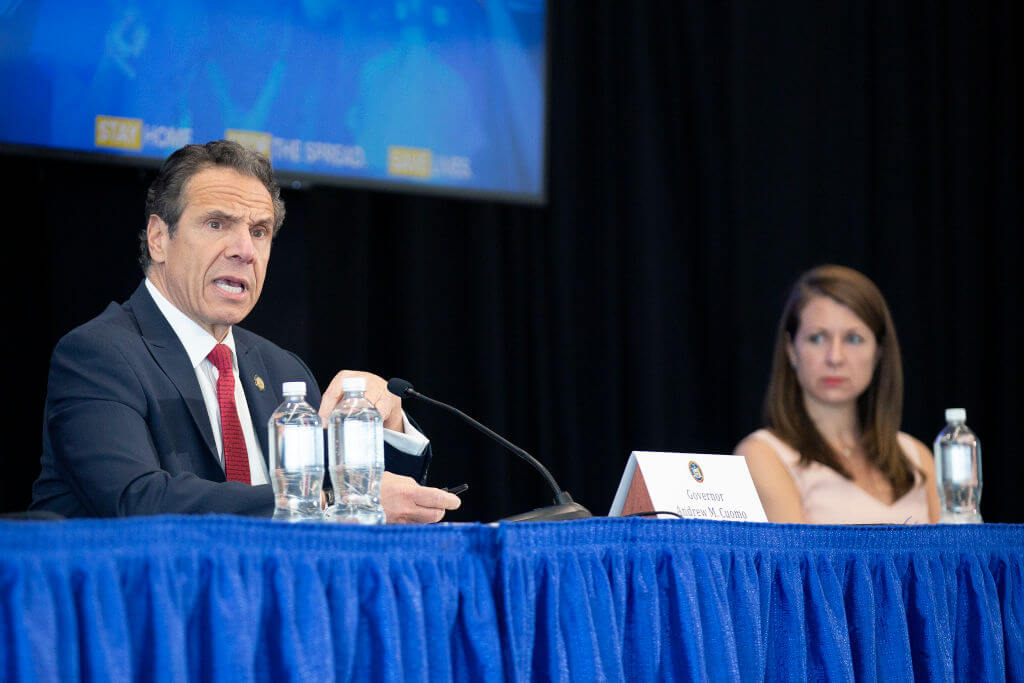Former Cuomo aide alleges that Kushner was behind Boro Park protests during COVID-19 outbreak
Melissa DeRosa, fomer Gov. Andrew Cuomo’s right hand, recounts the Orthodox protests against the governor following the blowup of a ‘nonaggression pact’ with Trump

Then Gov. Andrew Cuomo and his secretary Melissa DeRosa on April 28, 2020. Photo by Stefani Reynolds/Getty Images
An aide close to former New York Gov. Andrew Cuomo alleges that the campaign to reelect former President Donald Trump fanned unrest in New York’s Orthodox neighborhoods over COVID-19 restrictions imposed by the state in the fall of 2020. The aide, Cuomo’s former secretary, also levels the accusation against Trump’s son-in-law, Jared Kushner, in her new book. She describes the campaign’s behavior as retaliation against Cuomo following a public disagreement between the governor and Kushner.
“Something about the sequence of the events struck me as orchestrated,” writes Melissa DeRosa of the two days of demonstrations against Cuomo’s coronavirus restrictions in Brooklyn’s Borough Park. Her book, “What’s Left Unsaid: My Life at the Center of Power, Politics & Crisis,” is scheduled for release on Tuesday.
The demonstrations, on Oct. 7 and 8, turned violent. Orthodox New Yorkers resented Cuomo’s executive order limiting attendance at houses of worship. And they felt he singled out Orthodox neighborhoods in Brooklyn and Queens when he publicly noted their high infection rates.
DeRosa suggests in the book that Trump, whose poll numbers were flagging, tweeted about an earlier attempt to break up an Orthodox gathering in Crown Heights to embolden the protesters. She writes that the Trump campaign helped formulate messaging used by protesters tying Cuomo to high death rate in New York nursing homes. And she notes a robocall sent to households in the Hasidic community in Yiddish that encouraged people to bring ‘Cuomo killed thousands’ signs to the demonstrations. Cuomo had cited the call when he accused the Trump campaign of fomenting violence at the protests. (Organizers later denied the Trump campaign was behind it.)
“It was a nakedly political and cynical ploy by the Trump campaign to further damage the governor,” writes DeRosa. She also thought Kushner was involved. “I privately speculated about whether Jared Kushner, whose family was notoriously close with the ultra-Orthodox communities in New York and New Jersey, had a hand in it.”
Spokespeople for the Trump campaign and Kushner didn’t immediately respond to a request for comment.
Until the COVID-19 outbreak, Cuomo enjoyed a healthy relationship with the Orthodox community. In his 2014 reelection campaign, Cuomo did better in districts with significant Orthodox populations than in predominantly non-Jewish neighborhoods of New York City.
After the demonstrations, DeRosa writes, Cuomo “spent days personally calling prominent rebbes and community leaders,” imploring them to “bring sobriety and rationality” to the situation and postpone a major wedding. In the calls, Cuomo cautioned that the mass gatherings and protests would not only spread the virus but also “demonize the Jewish community” in the mainstream media. The rabbis, according to DeRosa, “reluctantly agreed” to lower the temperature and adhere to the restrictions.
Cuomo resigned in 2021 after multiple women accused him of sexual harassment.
How a ‘nonaggression’ deal with Kushner blew up
DeRosa’s speculation about Kushner’s involvement with the protests came after his relationship with the governor, which had once been close, soured. Kushner had disliked Cuomo’s speech to the Democratic National Convention, in which he criticized Trump and the federal COVID response.
She writes that Cuomo was initially hesitant to lambast the Trump administration, and that he had up until then a “nonaggression pact with Trump” to make sure New York received its share of federal assistance. After the speech, his fears about provoking Trump and endangered federal aid to the state materialized, DeRosa writes. The president went on a Twitter rampage against the governor. And in the midst of a morning meeting with Cuomo, DeRosa received a phone call, during which an irate Kushner said “the deal is off” and “we will not negotiate with you anymore.”
Months earlier, during the peak of the COVID-19 crisis in New York, Kushner praised Florida to DeRosa, which had remained open for business, and disparaged New York, with its many COVID-19 restrictions and rising death toll. “His tone was smug,” she writes.
According to DeRosa, Kushner told her: “We’ve done polling, and you guys are in the wrong place on this.” He added that in battleground states, “people do not support these shutdowns there. And they want their kids back in school and the economy open.”
DeRosa writes that she then wondered: “Was New York not part of Trump’s America, all of a sudden?”























